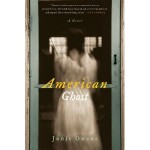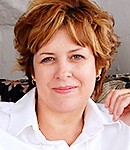I’ve been a fan of Janis Owens since we met at the Bookmarks Book Festival in 2009 — and that was before I knew of the accolades Pat Conroy had bestowed upon her. Her new novel AMERICAN GHOST (Scribner, hardcover) is a must-read. Without giving away too much, it’s about a spectacle lynching in a small Florida town and what happens seventy years later when several people directly and indirectly affected by it seek closure and more.
Q. Congratulations on publishing a novel (and an excellent one) that you worked on for thirty years. Does it really feel “finished” and why did it take so long?
Since this novel has so many ties to real history, it will never feel finished to me, because the real spectacle lynchings and mob actions that it is drawn from (several of them) are all so unfinished – technically still locked up in secrecy – not even openly discussed, much less resolved. I am satisfied I didn’t choose to be complicit with the silence and my fictionalized account might help to compel dialogue on the subject, which might help unearth more of the history. I think this an early stop in the overall restoration process in that the viciousness of the brutality has hardly been acknowledged, much less repented of, or publicly regretted. It’s still in the “let sleeping dogs lie” stage.
Q. That makes me wonder about your previous trilogy – MY BROTHER MICHAEL, MYRA SIMS, THE SCHOOLING OF CLAYBIRD CATTS. Did you know when you started the first one it would grow into three books or was it a case of the characters still talking to you after the previous book was released?
I enjoyed the Catts family so much when I was writing MY BROTHER MICHAEL, but Gabe Catts, first-person protagonist, was so hard-headed and opinionated that it occurred to me that he’d never get the entire story right (and his own self-absorption became a driving force for the novel.) I thought then that in order to convey the broader family story it would have to be told from different points of view, and I entertained myself thinking how those points of view would contrast and how they would illuminate each other. But I only decided to really attempt it after MBM was sold and in galleys, when I had lunch with my publisher and casually mentioned such an idea. He was absolutely on-board and sent me a contract the next day.
Q: AMERICAN GHOST is my favorite kind of fiction that has deep roots not only in reality but in the author’s life. The veracity rang so true on every page that you had me googling “Henry Kite” and “Hendrix, Florida” within ten pages. What are the true connections to you and the 1934 Claude Neal lynching in Marianna, Florida, on which the Kite lynchings are based?
I grew up knowing the very bare, very elementary version of the lynching of Claude Neal, a farmhand accused of the murder of a neighbor, Lola Cannady in Greenwood, Florida, whose body was brought to town and hung from a well-known tree on the courthouse square. When I was 22, a student at UF, I wrote a paper on the lynching, which had become infamous for reasons of its brutality (they tortured Neal inhumanly before he was displayed in Marianna.) At the time, there were living witnesses, and I was able to dig up a few truth-tellers, who volunteered their versions of the day. It was obviously still a great collective trauma, and once word got out that I was writing a paper, my sources dried up quickly. I was struck by the force of the lock-down, and over the years, heard other small stories – some heroic and some bestial – around the well-known practice of spectacle lynching in North Florida. I moved to Newberry when I finished UF and heard tales of an earlier lynching in 1916 at the edge of town in a triangle of roads still called “Lynch Hammock.” Rumor was that an entire family, including two women (one pregnant) was hung there. I knew several friends whose family was complicit, but the mob members had been made to touch everybody and take an oath they’d not speak – an oath that was still very much in operation.
The racial history of Hendrix and Henry Kite is a work of fiction, drawing on elements of both the Claude Neal murder and the Newberry Lynching. Both histories had similar elements: a black man with a reputation as a trouble maker, who is accused of a violent crime and becomes a victim of a vigilante action so relentless that their families and communities are destroyed in the process. The aftermath of that violence is a legacy of secrecy and shame that persists till this day. There is already speculation which little hamlet I based Hendrix on, but as with the lynching, I based it on the known histories of several places.
Q: What’s your advice to anyone trying to get out of a very small town like Hendrix, or any place where they feel trapped by customs and familial expectations?
In my experience, the easiest way to get out of a closed-minded situation is to find a public library and start reading books. The books will be like breadcrumbs: they’ll lead you to your true home.
Q: May I extend my deepest sympathies on the recent loss of your mother. It must seem like “the best of times, the worst of time” with her not here to see the acclaimed reception of AMERICAN GHOST. What influence did she have on you as a writer? Also, the iconoclastic Harry Crews, one of your early mentors, died this past year. Could you share a few words on his impact on your writing and your life as well?
It has been a grievous loss, though her death was not without mercy and the particular grace that carried her through her entire life. I simply wouldn’t have been a writer without her – she passed on her love of books and was one of the most brilliant storytellers on earth, with a particular eye to finding and relaying the heroic in the most humble human situation. Now that I think of it, Harry had that same ability. They were both Georgians of dirt-poor origins, and both honored books and stories at the same level: not as entertainment, or distraction, but as a way of making sense of this strange and hard world. Books were their religion and reading and telling stories nothing less than a means of salvation. Mama told me – by example more than words – that being a novelist was the highest calling; Harry was the teacher who told me, upon reading my first short story that was I was indeed a writer. To have been influenced by both of them, and early in life, makes me one lucky Cracker.
@JanisOwens on Twitter

